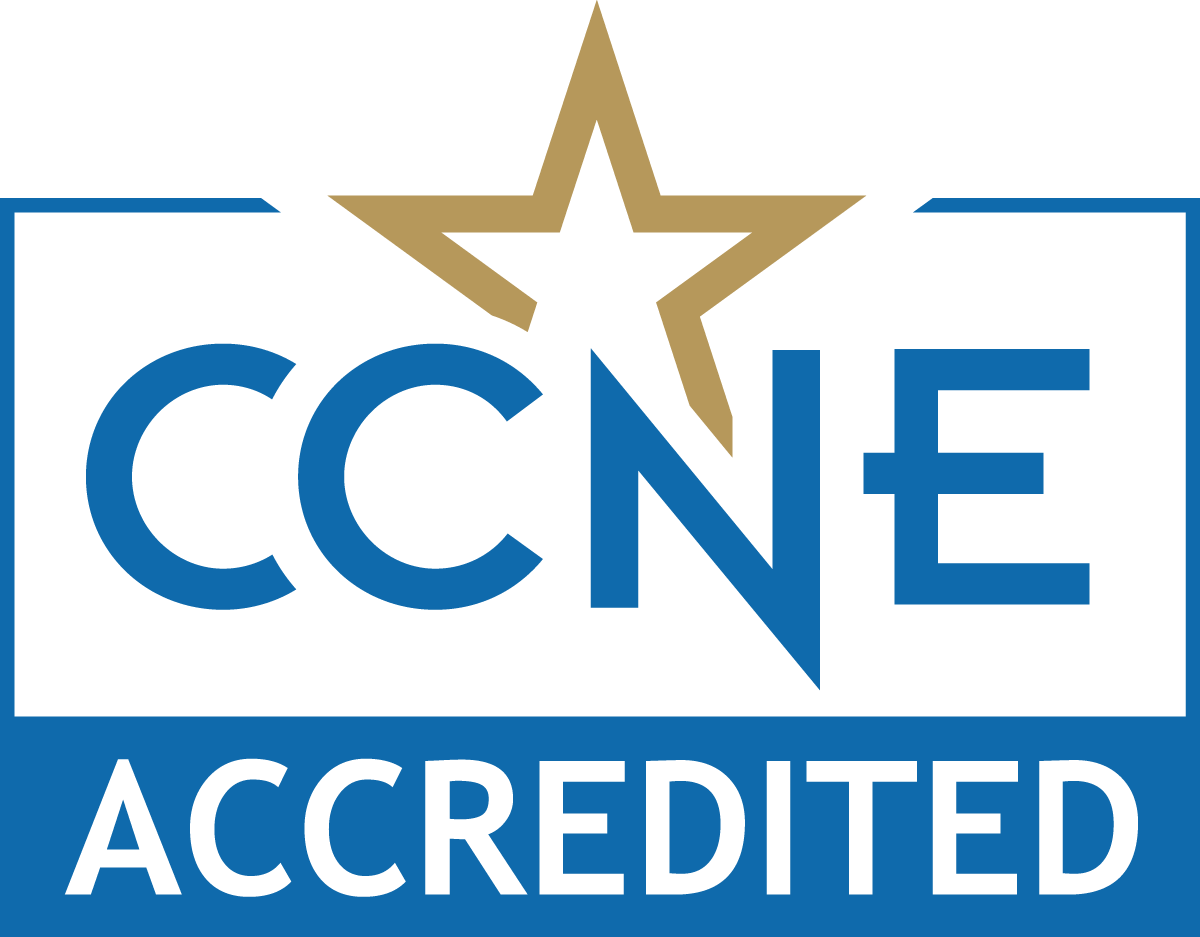Offered On-Campus
Offered Online
ACCREDITATION
Accreditation
Maranatha has been accredited under the Higher Learning Commission for nearly 30 years. Accredited public, private, and Christian colleges and universities accept degrees earned at Maranatha as a foundation for graduate studies and have accepted credits earned at Maranatha for transfer. Maranatha is listed in the Higher Education Directory printed for the United States Department of Education. Our rigorous academic programs prepare students to continue their education on a graduate level and earn the credentials needed in specific fields.
School of Education
The School of Education programs at Maranatha are recognized by the Wisconsin Department of Public Instruction for purposes of teacher certification.
School of Nursing
The baccalaureate degree program in nursing at Maranatha Baptist University is accredited by the Commission on Collegiate Nursing Education (http://www.ccneaccreditation.org), 655 K Street NW, Suite 750, Washington DC 20001, (202)887-6791. CCNE is an autonomous accrediting agency that ensures quality and integrity in baccalaureate and graduate nursing programs, and accreditation through CCNE assists nursing students in meeting standards for entrance into graduate programs.
Which accreditation is preferable?
When students are looking for a college, accreditation status is one of the most important factors to consider. Colleges and universities are awarded accreditation after successfully undergoing a voluntary external review by a private accrediting agency to evaluate the quality of their institution and effectiveness in executing their stated mission. While the evaluation criteria among accrediting agencies tend to be similar—measuring such areas as expected student achievement, curriculum, and faculty—not all forms of accreditation are equal. Most accredited colleges and universities are divided into two basic types: institutional or national accreditation. What’s the difference?

Institutional Accreditation
In terms of sheer numbers and status, the most recognized type of accreditation in the United States is institutional accreditation. Of the approximately 20 million students enrolled in accredited colleges and universities, 17 million are in nearly 3,000 institutionally accredited institutions. The institutions are accredited by one of six institutional accrediting agencies (Middle States, New England, The Higher Learning Commission [Central], Northwest, Southern, and Western). The agencies are in turn recognized by the U.S. Department of Education (USDE) and CHEA, a private organization.
Since 1993, Maranatha has been accredited by The Higher Learning Commission (www.hlcommission.com, 312-263-0456). This institutional accrediting organization focuses on quality improvement and encourages Maranatha to accomplish its mission. Accredited public, private, and Christian colleges and universities accept degrees earned at Maranatha as a foundation for graduate studies and accept credits earned for transfer. Maranatha chose institutional over national accreditation for two reasons. First, national accreditation tends to be very prescriptive; there are specific requirements concerning curriculum, faculty standards, etc. The Higher Learning Commission is more flexible and allows the schools to establish and maintain their own identity. Second, the faith-based accrediting agencies routinely interject “faith” exercises into their meetings and expectations, something institutional agencies do not do. Maranatha has no desire to participate in religious activities with the non-Baptist, non-fundamentalist schools in the faith-based accrediting agencies. (Note: Although this has not been the case, if at any point we would have to compromise our mission to maintain accreditation, we certainly would give up our institutional accreditation. While accreditation is valuable for our students, maintaining our mission is paramount.)
Recently a number of Christian colleges have pursued accreditation, similar to MBU’s historic decision in the early 1990s. We believe this is a good thing and rejoice in the successes of these sister institutions and believe their decisions will benefit both their current students and graduates. Each college or university makes these important choices guided by their history and values. We respect their choices and value their friendship.
National Accreditation
National accrediting organizations operate throughout the country and usually accredit single-purpose institutions focused on a specific mission, such as business. About 35 percent of this type are degree-granting and 65 percent are non-degree-granting. Four faith-based accrediting organizations—such as the Transnational Association of Christian Colleges and Schools (TRACS) and the Association for Biblical Higher Education Commission on Accreditation (ABHE)—accredit about 400 faith-based institutions. According to the Council for Higher Education Accreditation (CHEA), students who attend nationally accredited institutions sometimes have difficulty transferring to and getting their credits accepted by institutionally accredited schools. Because decisions about transfer of credit are made at the local level by colleges and universities, reasons for denying credits may vary widely.
Programmatic Accreditation
 Programs, departments, or schools within an institution can also be accredited. Most programmatic accrediting agencies review units within a college or university that is accredited by one of the institutional accrediting commissions. In addition to North Central Association accreditation, for example, Maranatha has been accredited since the fall of 2012 with the Commission on Collegiate Nursing Education (CCNE), an autonomous accrediting agency that ensures the quality and integrity of education programs preparing effective nurses. Some programmatic accrediting agencies accredit vocational institutions and educational programs within non-educational settings, such as hospitals.
Programs, departments, or schools within an institution can also be accredited. Most programmatic accrediting agencies review units within a college or university that is accredited by one of the institutional accrediting commissions. In addition to North Central Association accreditation, for example, Maranatha has been accredited since the fall of 2012 with the Commission on Collegiate Nursing Education (CCNE), an autonomous accrediting agency that ensures the quality and integrity of education programs preparing effective nurses. Some programmatic accrediting agencies accredit vocational institutions and educational programs within non-educational settings, such as hospitals.
State Licensure Programs
Another type of approval that colleges can seek is “state licensure” for programs that require this credential to serve in a public or professional capacity. It is important to note that the license is NOT upon the college but that the college has been certified as having an academic program that qualifies students to meet identified standards in terms of curriculum and outcomes verification. Wisconsin has two such licensing options available for its students.
Maranatha’s Teacher Education Program is designed to qualify successful graduates for a teaching license from the Wisconsin Department of Public Instruction. Because Wisconsin maintains standards among the highest in the nation, its license is accepted for reciprocity in most states (check with your state for reciprocity policies). When students graduate from one of the School of Education programs, they may apply for licensure in Wisconsin or in another state. Our Teacher Education Program also satisfies the licensure requirements of the American Association of Christian Schools and the Association of Christian Schools International.
Maranatha’s Business Department also has an accounting program that contains all the curricular requirements necessary to sit for the CPA examination in a student’s chosen state. Unlike teacher education, the Business Department does not directly certify completion, but each state uses the transcripts of the institutionally accredited institution and applies individual state requirements related to work experience to qualify students to sit for the rigorous CPA exam. Maranatha has had the accounting major since 2009 and rejoices in the success of its graduates.
Institutional accreditation is an essential prerequisite at Maranatha to offering both the Teacher Certification and CPA options for its graduates.
No Accreditation
Just because a college is not accredited does not mean it is necessarily poor in quality. Some institutions are new and have not met minimum requirements for review, or they may have chosen not to pursue accreditation for other reasons, which they should be willing to articulate. If a student is considering an unaccredited college, he or she should find out whether the college has a different form of review to evaluate and improve its quality. Also, the student should check with potential graduate schools and employers to see whether they would accept degrees from the unaccredited institution.
Fake Accreditation
With the advent of distance learning, in which legitimate colleges and universities let students earn degrees by taking classes online, “diploma mills” are also on the rise. These bogus schools issue fake diplomas and transcripts, usually in exchange for money and minimal (or no) coursework. Fake accrediting organizations are also proliferating (there were 260 in 2003), lending an air of legitimacy to the dubious degree mills.
To ensure they enroll in institutions accredited by U.S.-recognized accrediting organizations, students should check this list.
Accreditation is a multifaceted issue. If accreditation is an important factor in your college choice, you should carefully ask questions of independent sources regarding types and effectiveness of various accrediting organizations.

